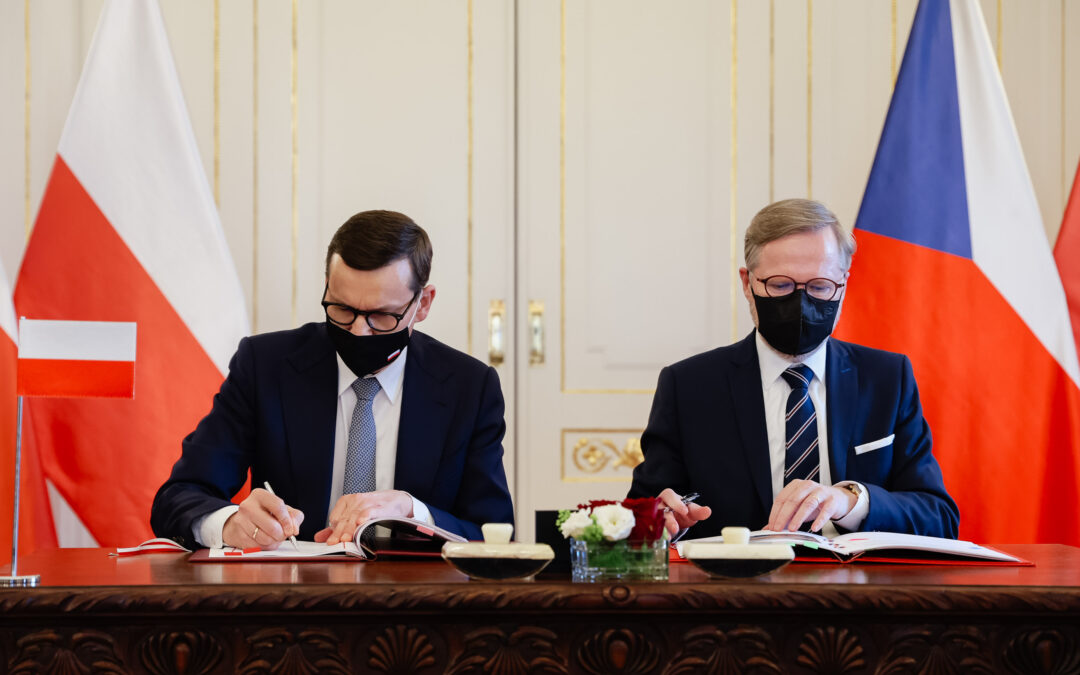Poland and the Czech Republic have signed an agreement to end a long-running dispute over a coal mine on the Polish side of their shared border. The issue has been costing Poland €500,000 in daily fines over its refusal to comply with an EU court order to stop operations at the Turów mine.
Polish Prime Minister Mateusz Morawieck today flew to Prague to finalise the €45 million deal with his Czech counterpart, Petr Fiala. The leaders hailed the outcome as a success, with Morawiecki noting that it will allow the mine to continue functioning without disruption.
However, local residents on the Czech side of the border have expressed anger at Prague dropping its lawsuit, while today the European Court of Justice’s (ECJ) advocate general issued an opinion finding that Poland violated European law by extending the mine’s operating licence.
Last May, the ECJ issued an interim measure requiring operations at the open-cast lignite mine to cease. After Poland failed to comply, the court in September ordered it to begin paying daily fines of €500,000.
Warsaw has continued to insist that it will neither pay the fines nor close the mine, which it says supplies 4-7% of Poland’s electricity via the adjacent coal-burning power station. Instead, it has sought to find a negotiated settlement with Prague.
The agreement announced today includes €45 million in compensation from the Polish government and state power company PGE, which owns the mine. It also sets out new rules of cooperation around the coal mine.
This includes a Polish pledge to construct an underground barrier to stop water outflow across the border as well as a fund for local and regional projects aimed at environmental protection.
“We are extremely happy,” said Fiala, who noted that “the talks were tough and long,” reports Business Insider Polska. Morawiecki said he hoped the agreement would bring “a return to the times before Turów” and that the Czech complaint lodged with the ECJ would be withdrawn “today or tomorrow”.
However, the deal has angered local residents and activists. “Today our government signed away our right to water,” said Milan Starec, a local resident speaking on behalf of the Uhelná Neighbourhood Association, in a statement sent to Notes from Poland.
“This deal has been reached in total secrecy, without the involvement of affected people like me,” he continued. “PGE’s botched underground wall will do nothing to resolve our water crisis.”
🇵🇱🇨🇿 Premier @MorawieckiM i premier Czech @P_Fiala podpisali umowę między Rządem RP a Rządem Republiki Czeskiej o współpracy w zakresie odnoszenia się do skutków na terytorium Republiki Czeskiej wynikających z eksploatacji kopalni odkrywkowej węgla brunatnego #Turów. pic.twitter.com/AoRvkVeOXK
— Kancelaria Premiera (@PremierRP) February 3, 2022
In a separate development today, ECJ advocate general Priit Pikamäe issued an opinion finding that Poland infringed EU law by extending a license for the Turów mine without completing the required environmental impact study. The Czech Republic has said that local villages have been drained of water as a result.
The opinion, which was issued as part of the proceedings launched by Prague last year, is not binding to the court. However, final ECJ rulings often reflect the advocate general’s opinion. Two days ago a Polish court also issued a similar opinion.
Poland has so far acrued more than €68 million from the EU for failing to comply with the ECJ order to close the mine. Last month, the European Commission announced that the first tranche of payments, totalling €15 million, would be taken out of Poland’s EU funds.
Rzecznik generalny Priit Pikamäe: przedłużając o sześć lat termin obowiązywania koncesji na wydobywanie węgla brunatnego w kopalni #Turów bez przeprowadzania oceny oddziaływania na środowiska, Polska naruszyła prawo Unii pic.twitter.com/GQXxkPKpb1
— Patryk Wachowiec (@Patryk_1234567) February 3, 2022
Main image credit: Daniel Gnap/KPRM (under CC BY-NC-ND 2.0)

Maria Wilczek is deputy editor of Notes from Poland. She is a regular writer for The Times, The Economist and Al Jazeera English, and has also featured in Foreign Policy, Politico Europe, The Spectator and Gazeta Wyborcza.




















